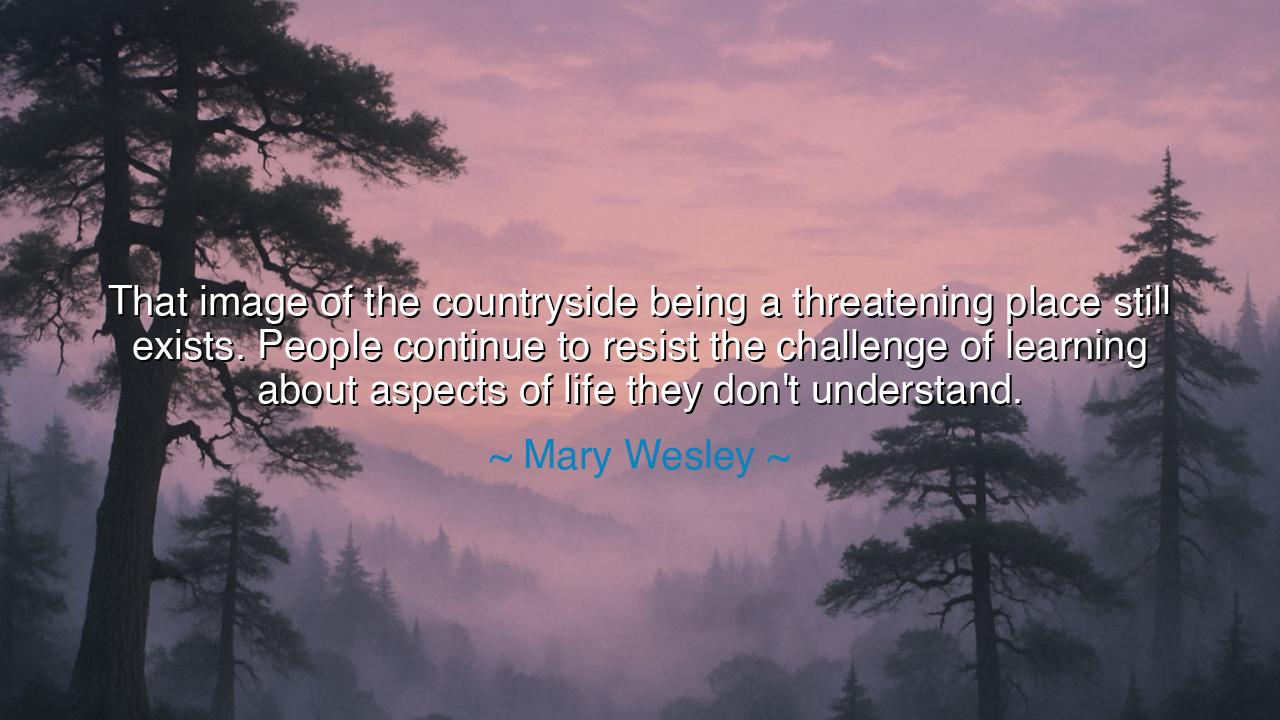
That image of the countryside being a threatening place still
That image of the countryside being a threatening place still exists. People continue to resist the challenge of learning about aspects of life they don't understand.






Mary Wesley, the novelist who unveiled the hidden passions and secrets of English life, once said with piercing clarity: “That image of the countryside being a threatening place still exists. People continue to resist the challenge of learning about aspects of life they don’t understand.” These words, though clothed in the language of her homeland, speak of something far greater than rural England. They speak of the human heart, of fear before the unknown, and of the courage required to step beyond the walls of familiarity.
When she names the countryside as “threatening,” she invokes more than trees, fields, and hedgerows. The countryside becomes a symbol of all that lies beyond the boundaries of comfort—of wilderness, of mystery, of the ungoverned and untamed. In stories old and new, forests and rural places have often been cast as perilous: the lairs of wolves, witches, or rebels. But Wesley suggests that this image is not just about geography. It is about perception, about how people turn the unfamiliar into a shadow and resist the call to explore what they do not yet know.
Her wisdom reveals the ancient struggle between fear and knowledge. For to truly learn is to journey into the countryside of the mind, to walk into terrains not yet mapped by our understanding. And just as villagers once hesitated to leave the safety of their settlements for fear of beasts and brigands, so too do modern souls resist leaving the fortress of habit, clinging to old beliefs and prejudices rather than embracing the challenge of growth.
History gives us powerful examples of this. When Galileo raised his telescope to the heavens and declared that the earth was not the center of the universe, many recoiled in terror. To them, the cosmos had become a dangerous countryside, threatening the safety of their world. They resisted, not because the truth was unclear, but because it demanded they abandon familiar ground. In the same way, Wesley points to how individuals and societies often turn away from truths about life, love, death, and human complexity because they lie outside their cultivated gardens of understanding.
The threatening image of the countryside is also the threatening image of other people’s lives. The poor, the foreign, the marginalized, the misunderstood—these too become like wild landscapes to those who will not venture beyond their own circle. To resist the challenge of learning about them is to leave divisions unhealed, ignorance unbroken. But to walk into those lands with humility and courage is to discover kinship, to see that the unknown is not always hostile but often rich with beauty, insight, and shared humanity.
Wesley’s words are therefore a call to courage. They remind us that growth requires discomfort, that to truly live we must step beyond the cultivated paths of what we know and walk into the unknown with open eyes. The countryside of learning, though it may seem threatening at first, offers fruits and freedoms that cannot be found within the narrow fields of fear.
The lesson is clear: do not resist the challenge of what you do not understand. Do not allow the shadow of unfamiliarity to become a prison wall. Instead, walk into the wild—into the countryside of new ideas, new people, new truths. Read what unsettles you, listen to those who differ from you, question even what you thought certain. For it is only by such journeys that ignorance dissolves, that fear fades, and that wisdom, like a sunrise over the fields, reveals the vast and beautiful world beyond the walls of habit.
Thus, Mary Wesley’s words endure as a torch: the countryside is not your enemy, but your teacher. Step into it, with all its thorns and shadows, and you will find that what once threatened you will become the very ground of your transformation.






AAdministratorAdministrator
Welcome, honored guests. Please leave a comment, we will respond soon